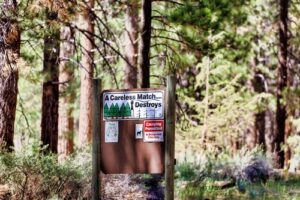
U.S. Rep. Cathy McMorris Rodgers (R-WA) on June 20 sponsored legislation to encourage more proactive management of federal forests, reduce wildfire risks, and support timber communities that invest in educational opportunities and economic development.
“By cutting through the red tape, opening the door for more local collaboration, and giving back to timber communities that help make it possible, this legislation is the key to ensuring our forests are healthy, keeping our communities safe, and shielding everyone from the harms of poor air quality,” Rep. McMorris Rodgers said on Tuesday.
The congresswoman introduced the Fostering Opportunities for Resources and Education Spending through Timber Sales (FORESTS) Act of 2023, H.R. 4228, to establish Forest Active Management Areas (FAMA) within each National Forest Unit and set an annual volume requirement for timber production within each FAMA to help manage areas that are identified as overstocked and suitable for commercial harvest, according to a bill summary provided by her office.
H.R. 4228 also would encourage collaborative forest management projects by prioritizing local collaboration, including planning, decision-making, and management processes with input from multiple interested parties representing diverse interests, the summary says.
“When wildfire smoke drifted down the East Coast earlier this month, many Americans were forced to face a reality we endure every single summer in eastern Washington,” said Rep. McMorris Rodgers. “For decades, catastrophic fires have ripped through our communities and diminished quality of life. But it doesn’t need to be this way.
“The FORESTS Act is a results-driven approach that takes what we’ve learned through proactive and collaborative management of the Colville National Forest and puts it into practice quickly,” she said.
If enacted, H.R. 4228 also would exclude the designation and management of FAMAs from the National Environmental Policy Act of 1969 and reform the litigation process to allow projects negotiated by collaboratives to utilize arbitration instead of judicial review, according to the summary.
Timber communities would be supported by giving counties where a project is conducted 25 percent of the revenues generated by a management project in a FAMA, and would allow communities to benefit from timber receipts resulting from stewardship contracts within their county, states the summary.



